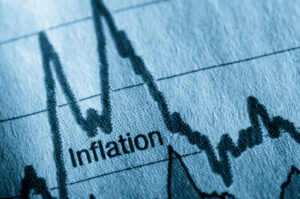It’s hard to open a newspaper these days without seeing a headline telling borrowers that they should lock into a fixed rate as soon as possible. While this guidance may be great for selling newspapers, I’m not con vinced the advice itself will benefit those who take it. The basic logic seems to be that since we are at the bottom of the interest-rate cycle, and since it is inevitable that rates will eventually rise, borrowers are crazy to stay in variable. But how long will it take for rates to rise? If you followed that logic in Japan in 1999, to use an extreme example, your decision to lock in would have cost you a lot of money because Japan’s rates haven’t moved much in more than a decade. While I agree that we are probably at or near the bottom of the interest-rate cycle, the key questions are when rates will start to rise and to what degree.
vinced the advice itself will benefit those who take it. The basic logic seems to be that since we are at the bottom of the interest-rate cycle, and since it is inevitable that rates will eventually rise, borrowers are crazy to stay in variable. But how long will it take for rates to rise? If you followed that logic in Japan in 1999, to use an extreme example, your decision to lock in would have cost you a lot of money because Japan’s rates haven’t moved much in more than a decade. While I agree that we are probably at or near the bottom of the interest-rate cycle, the key questions are when rates will start to rise and to what degree.
To be clear, I do think the central bank will start raising short-term rates this summer, but not with the speed that the alarmist headlines foretell. The current spread between the five-year variable and discounted fixed rates is almost 3%, so the prime rate would have to increase by more than that, and quickly, for you to be better off by converting to fixed. The only scenario I can see where the central bank will increase rates that quickly and to that degree, would be to curb runaway inflation.
What Could Cause Runaway Inflation in the Short Term?
Although there is much debate about the factors that contribute to inflation, I think the best short-term predictor is the condition of the labour market.
When unemployment is low and the labour market is tight, companies who want to expand must bid up the price of wages and salaries in order to attract workers. This cost increase drives up prices and sends inflationary ripples throughout the economy because labour is the most expensive single component  of economic production. Our unemployment rate is high right now (8.2% vs. 7% avg. last 10/yrs) and there is no tightness in the labour market. In fact, our current rebound has been dubbed a “jobless recovery” because new job creation has not accompanied our economy’s return to growth. So labour is cheap, and companies wanting to increase production typically do not have to pay more to do it. Until we see a significant reduction in the unemployment rate, I don’t see short-term inflation being a problem that requires a dramatic increase in rates.
of economic production. Our unemployment rate is high right now (8.2% vs. 7% avg. last 10/yrs) and there is no tightness in the labour market. In fact, our current rebound has been dubbed a “jobless recovery” because new job creation has not accompanied our economy’s return to growth. So labour is cheap, and companies wanting to increase production typically do not have to pay more to do it. Until we see a significant reduction in the unemployment rate, I don’t see short-term inflation being a problem that requires a dramatic increase in rates.
There are two other major factors that have a significant effect on inflation, and neither would support short-term inflation now. One is the percentage of capacity utilization in the economy. When there is slack in overall capacity utilization, it is hard for businesses to raise prices. In Q4, 2009, our capacity utilization rate was 70.9% and that statistic doesn’t start to look inflationary until it reaches the low 80% range. The other factor is the value of our dollar, which now trades roughly at par with the US dollar, making our imports cheaper and further offsetting inflationary pressure.
If You Have a Variable Rate Mortgage…
Your courage has been tested as of late. After all, it’s pretty easy to stay in your variable-rate mortgage when fixed rates are below 4%, but with fixed rates rising by almost 1% in the past month, your escape route has been getting more expensive by the day. Mark Carney’s promise not to raise rates ends in June, and after that many pundits are predicting that rates will go to the moon. To refute that sentiment I offer the following five points:
1. If the central bank is going to aggressively raise the overnight rate to curb short-term inflation, where exactly is this inflationary pressure going to come from? The most recent Consumer Price Index report from StatsCan shows inflation dropping by .2% to 1.4%, which is well below the central bank’s targeted threshold of 2%. The short-term inflation argument isn’t supported by the data (unemployment rate or otherwise). Especially because…
2. As explained above, our appreciating dollar is putting downward pressure on inflation by lowering the cost of our imports while at the same time slowing our economy by raising the price of our exports. If we raise our interest rates and the US doesn’t (and every indication is that they won’t do so for the foreseeable future), our dollar will appreciate further and our economy will slow even more. Canada has tried to decouple its interest-rate policy from the US in the past, and the experiment has always ended quickly. I’m not saying we can’t have higher rates but I don’t think we can be 3% higher without it hammering our economy.
3. Bank economists’ doom and gloom forecasts are nothing new. The bank’s most profitable mortgage product is the five-year fixed-rated term so we shouldn’t be surprised when their analysis tilts that way. (For more on this, check out my post called “Why the Five-year Fixed-rate Mortgage is Overrated”.)
4. If Mark Carney does want to raise rates, it’s because he is worried about a housing bubble (more on that in my next post). In a recent update, David Rosenberg, Chief Economist at Gluskin Scheff, calculated that a 1% increase in interest rates would result in a 5% decrease in housing prices and my favourite economist for mortgage purposes, Benjamin Tal, recently commented that rates will not have to rise by as much as the market thinks to slow house-price appreciation. If they’re right, then I expect the Bank of Canada to cool the market gradually and with measured increases, with some time in between, to see what effects they’re having. If we do get 3%+ increases, I think it will take years, not months.
in interest rates would result in a 5% decrease in housing prices and my favourite economist for mortgage purposes, Benjamin Tal, recently commented that rates will not have to rise by as much as the market thinks to slow house-price appreciation. If they’re right, then I expect the Bank of Canada to cool the market gradually and with measured increases, with some time in between, to see what effects they’re having. If we do get 3%+ increases, I think it will take years, not months.
5. Have you ever noticed that when everyone expects one thing to happen, it usually doesn’t? A famous investor named Bob Farrell, who made a lot of money following this truism made it his Rule #9: “When all the experts and forecasts agree – something else is going to happen.”
In the past month, the five-year fixed rate has increased by almost 1%, putting the current spread between fixed and variable at (or near) its all-time high. Is the security premium you have to pay to lock in your variable rate worth it? If you’ve got more than 20% equity in your house and can sleep at night with interest-rate uncertainty, I say no. It’ll take some courage but if you can hang in there, do it.
A final thought. While fixed rates provide insurance against inflation, variable rates provide insurance against the risk of low growth or worse, deflation. Put another way, if inflation does kick in, it will be because the economy is growing, which will correspond with rising incomes (hopefully including yours) and increased job stability. In that environment, borrowers should be able to afford an increased mortgage payment. If the economy is flat, or shrinking, and you suffer as a result, paying a substantial premium for a fixed-rate payment could become painful.
provide insurance against the risk of low growth or worse, deflation. Put another way, if inflation does kick in, it will be because the economy is growing, which will correspond with rising incomes (hopefully including yours) and increased job stability. In that environment, borrowers should be able to afford an increased mortgage payment. If the economy is flat, or shrinking, and you suffer as a result, paying a substantial premium for a fixed-rate payment could become painful.
If You Have a Fixed-rate Mortgage…
With more than half the time remaining on your five-year fixed term, then this discussion is academic for the moment. (Your penalty is probably too high to warrant any changes, but you can use our penalty calculator to check if you wish.) If you’re past the halfway point in your term and are thinking of switching to a variable-rate mortgage, then the recent 1% increase in fixed rates is good news. Your penalty is calculated using the difference between your rate and the current rate for the equivalent remaining term, and it has probably been cut in half over the last month (again, for an estimate, check out our penalty calculator). Or you can just sit tight and enjoy the good night’s sleep that comes with rate certainty. It’s not really a right or wrong decision because, either way, you’re still enjoying a good rate by any historical comparison.
Wrap Up
The central bank’s next interest-rate decision on June 1, 2010, will be the most highly anticipated in a long time. As his guarantee period for not raising rates passes, Mr. Carney must weigh a stable inflationary environment against the desire to cool off a hot housing market while not damaging the delicate green shoots of our recovery. My bet is that the overnight rate will be raised gradually, and not to the degree or with the speed that most pundits are forecasting.
raising rates passes, Mr. Carney must weigh a stable inflationary environment against the desire to cool off a hot housing market while not damaging the delicate green shoots of our recovery. My bet is that the overnight rate will be raised gradually, and not to the degree or with the speed that most pundits are forecasting.
In short, don’t believe the hype!







